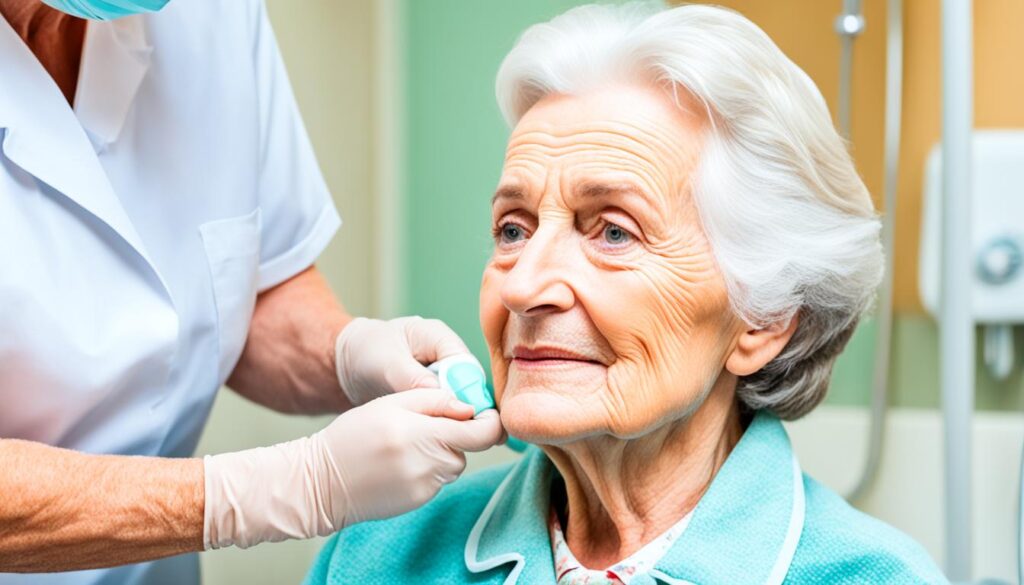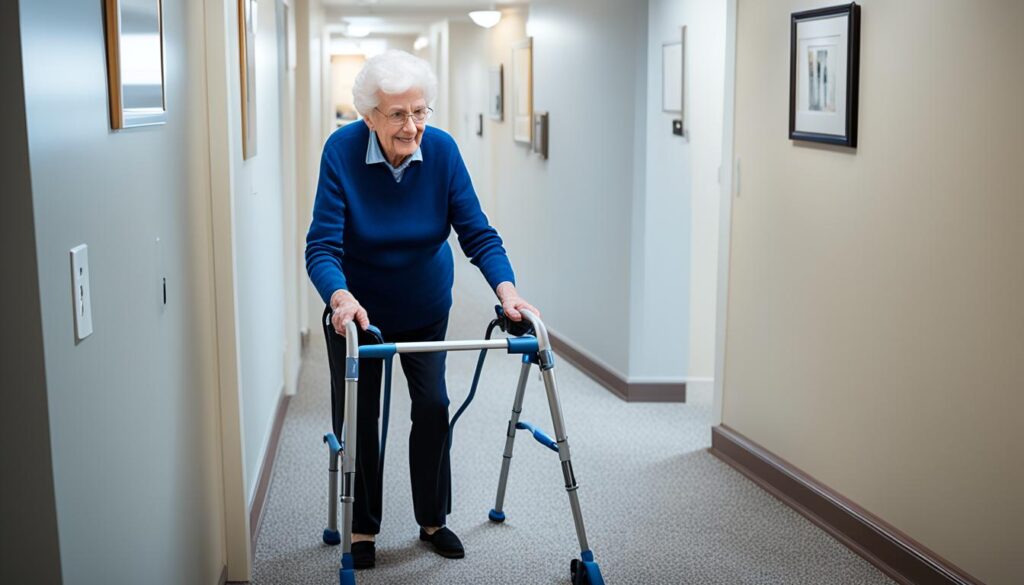As more people get older, caring for our elderly loved ones is becoming more important. How can we make sure they get the care, respect, and quality life they deserve? This article shares expert advice and practical tips to help improve elderly care and make their lives more comfortable.
Key Takeaways
- Prioritize personalized hygiene care and respect individual preferences
- Create a safe and accessible home environment to prevent falls and ensure security
- Offer physical assistance with daily activities while promoting independence
- Effectively manage medications and utilize assistive devices to address mobility issues
- Foster social engagement and provide mental stimulation to support emotional well-being
Improve Elderly Care and Comfort Buy Now Frome Amazon
Addressing Hygiene Needs with Care and Respect
Keeping elderly people clean is key to their health and happiness. Not taking care of themselves can cause big problems like skin infections and dental issues. Caregivers must pay attention to the elderly’s hygiene needs and handle them with care and respect.
The Importance of Maintaining Elderly Hygiene
Older people may struggle with keeping themselves clean because of physical or mental issues. By sticking to a regular cleaning routine, using the right products, and respecting their choices, we can make their lives better. This helps prevent health problems.
Improve Elderly Care and Comfort Buy Now Frome Amazon
Respecting Personal Preferences and Promoting Independence
Helping elderly people with their personal care means respecting their choices and supporting their independence. Losing control can be hard for them, so it’s important to let them make some decisions. This builds trust and reduces stress during personal care.
| Hygiene Task | Importance | Caregiver Approach |
|---|---|---|
| Bathing | Maintains cleanliness and skin health | Offer choices, use appropriate products, ensure privacy |
| Oral Care | Prevents dental problems and maintains oral hygiene | Assist with brushing, flossing, and denture care |
| Nail and Foot Care | Promotes mobility and prevents infections | Trim nails, file calluses, and encourage wearing comfortable shoes |

“Maintaining elderly hygiene with care and respect is not only about physical well-being, but also preserving their dignity and independence.”
Creating a Safe and Accessible Home Environment
Making the home safe and easy to get around is key to better care for the elderly. Caregivers should work on preventing falls by putting in grab bars and removing dangers. They should also make sure lighting is good. Making changes like widening doorways and putting in ramps helps seniors move around better.
Improve Elderly Care and Comfort Buy Now Frome Amazon
Fall Prevention and Home Modifications
Falls are a big worry for the elderly, often causing serious injuries and lowering their quality of life. To help prevent this, caregivers should focus on these steps:
- Install grab bars in bathrooms, near stairs, and in other high-risk areas
- Remove loose rugs, cords, and other tripping hazards
- Ensure adequate lighting throughout the home, especially in hallways and stairwells
- Consider installing non-slip flooring or applying non-slip adhesive strips
- Implement home modifications, such as widening doorways and installing ramps, to enhance mobility and accessibility
Fire Safety and Home Security Measures
It’s also vital to focus on fire safety and security for the elderly. Caregivers should do the following to keep the home safe and secure:
- Install functional smoke detectors and carbon monoxide alarms throughout the home
- Regularly check and maintain electrical cords and appliances to prevent fire hazards
- Avoid the use of space heaters or candles without close supervision
- Secure the home with proper locks, deadbolts, and consider installing a home security system
- Ensure emergency numbers and a clear evacuation plan are readily available
By focusing on preventing falls and keeping the home safe from fires, caregivers can make a safer and more accessible place for the elderly. This improves their care and comfort.

Providing Physical Assistance with Activities of Daily Living
As elderly people get older, they might need help with daily tasks like bathing, dressing, grooming, and eating. Caregivers should be ready to offer kind and careful help. This ensures the senior feels comfortable and keeps their dignity.
Understanding what each senior needs and likes helps caregivers support their independence. This support can include helping with tasks like:
- Bathing and personal hygiene
- Dressing and undressing
- Grooming, including hair, nails, and oral care
- Feeding and assistance with meals
Caregivers should be patient and respectful when doing these activities. They should let the senior do as much as they can to keep their independence. Sometimes, using special tools and devices can make things easier and more comfortable for the elderly.
| Activity | Caregiver Considerations |
|---|---|
| Bathing | Ensure privacy, use non-slip mats, adjust water temperature, provide necessary support |
| Dressing | Offer clothing choices, use adaptive aids, allow the senior to dress themselves as much as possible |
| Grooming | Assist with hair, nails, and oral care, be mindful of the senior’s preferences |
| Eating | Provide nutritious meals, assist with cutting food, encourage independence, monitor intake |
By focusing on the senior’s comfort, dignity, and independence, caregivers can make sure they get the help they need. This approach helps keep elderly individuals happy and well.
Managing Medications and Addressing Mobility Issues
Managing medications is key for elderly care. Caregivers must work with healthcare providers. They need to make sure seniors take their meds as told, keep them safe, and talk about any issues. Helping with meds can stop bad reactions and keep seniors healthy.
Proper Medication Management and Administration
It’s vital to manage medications right for elderly people. Caregivers should:
- Work with healthcare providers on a detailed medication plan
- Make sure seniors take their meds correctly, including the right amount and time
- Keep meds safe and at the right temperature
- Watch for bad reactions or changes in how meds work
- Tell the healthcare team about any worries or updates
Utilizing Assistive Devices and Physical Therapy
Helping seniors move around is key for their health and freedom. Caregivers should think about using devices like canes, walkers, or wheelchairs. These help with moving and lower the chance of falling. Adding exercises and routines from physical therapy can also boost strength, balance, and flexibility. This helps seniors stay mobile and independent.
Improve Elderly Care and Comfort Buy Now Frome Amazon
| Assistive Device | Benefits |
|---|---|
| Canes | Improved stability and balance, reduced stress on joints |
| Walkers | Enhanced mobility, increased weight-bearing support |
| Wheelchairs | Allows for greater independence and access in limited mobility |
By managing meds and helping with mobility, caregivers can support seniors in staying healthy and independent. Working with healthcare providers and using devices and therapy can really change things for elderly people.
Improve Elderly Care and Comfort: Expert Tips
Improving elderly care means looking at the whole picture. We need to focus on their physical, emotional, and social needs. This way, seniors can age with dignity and comfort at home.
A recent study by the National Council on Aging found some key tips to make life better for the elderly:
- Prioritize personalized care: Know what each senior likes, can do, and needs. This keeps them independent and comfortable.
- Foster social engagement: Help them meet people through activities, events, or just talking. This fights loneliness and depression.
- Ensure a safe and accessible home: Make their home safe and easy to move around in. This lets them live independently.
- Provide comprehensive physical support: Help with daily tasks like bathing and dressing, but respect their choices.
- Optimize medication management: Work with doctors to make sure they take their medicine right and handle any issues.
Using these tips, we can make elderly care more complete and focused on the person. This helps seniors live well in their own homes.
“The true measure of a society is how it treats its most vulnerable members.” – Mahatma Gandhi
Improve Elderly Care and Comfort Buy Now Frome Amazon
Supporting Emotional Well-Being through Social Engagement
It’s key to focus on the emotional health of older adults for their overall happiness. Caregivers should help seniors stay socially active and build strong connections. This means setting up regular social events, encouraging chats with loved ones, and letting seniors enjoy their hobbies or help out in the community. Doing this can ease feelings of loneliness and isolation that many seniors face.
Improve Elderly Care and Comfort Buy Now Frome Amazon
Fostering Companionship and Meaningful Connections
Creating a caring social space is vital for older adults’ emotional health. Caregivers can arrange group outings, game nights, or book clubs for seniors to meet others. Talking with family and friends, in person or online, can also fight off loneliness.
Letting seniors do what they love or help others can make them feel part of the community. It gives them a sense of purpose. By supporting these social and meaningful activities, caregivers can greatly boost the emotional health of the seniors they care for.
| Activity | Benefits |
|---|---|
| Group Outings | Promotes social interaction and engagement |
| Hobby Clubs | Encourages pursuing personal interests and hobbies |
| Volunteer Work | Provides a sense of purpose and community involvement |
| Family Gatherings | Strengthens familial bonds and emotional support |
“Fostering social connections is essential for the emotional well-being of the elderly. Caregivers play a crucial role in creating opportunities for meaningful interactions and engagement.”
Promoting Mental Stimulation and Cognitive Activities
Supporting the emotional well-being of the elderly is key. It’s also important to give them chances to keep their minds sharp. Caregivers can help by offering activities that challenge the mind. This keeps the elderly engaged and improves their life quality.
Reading is a great way to keep the mind active. Encouraging the elderly to read books, newspapers, or magazines helps keep their brains sharp. It’s not just good for the mind; it’s also fun and mentally stimulating.
Puzzles like crosswords, jigsaw puzzles, and brain teasers are perfect for challenging the elderly’s minds. They need to solve problems, think spatially, and concentrate. This keeps their mental sharpness up.
Games, both old and new, are excellent for engaging the elderly’s minds. Board games, card games, and video games offer fun challenges and social time. Both are key for keeping the mind healthy.
Adding regular mental exercises to their day can also help. Activities like memory games, math drills, and learning new languages keep the mind sharp. They help prevent dementia or Alzheimer’s disease.
By adding these activities to the elderly’s daily life, caregivers support their emotional and mental health. This approach to care greatly improves the quality of life for the elderly.
| Activity | Benefits |
|---|---|
| Reading | Maintains cognitive function, provides intellectual stimulation |
| Puzzles | Improves problem-solving skills, spatial awareness, and concentration |
| Games | Provides mental stimulation and social interaction |
| Mental Exercises | Helps maintain cognitive function and prevent cognitive decline |
“Keeping the mind active and engaged is crucial for the overall well-being of the elderly. Caregivers who incorporate a variety of cognitive activities into the daily routine can make a significant difference in the lives of their patients.”
Accessing Community Resources and Support Services
Caregivers and the elderly can greatly benefit from many community resources and support services. These resources include local Area Agencies on Aging, state and federal government programs, and community organizations. They offer services, information, and help for the elderly.
Exploring Local and Government Resources
Finding the right resources can seem hard, but it can really change things for caregivers and seniors. Start with local Area Agencies on Aging. They connect people with support services like in-home care, transportation, and meal delivery. State and federal government programs, like Medicaid and Medicare, also offer financial and healthcare aid to those who qualify.
| Resource | Description | Benefits |
|---|---|---|
| Area Agencies on Aging | Local organizations that connect seniors and their caregivers with a wide range of support services | In-home care, transportation, meal delivery, and more |
| Medicaid and Medicare | State and federal government healthcare and financial assistance programs | Coverage for medical expenses, prescription drugs, and other healthcare-related needs |
| Community Organizations | Non-profit groups that offer specialized services and resources for the elderly | Social activities, educational programs, and various support services |
By looking into these resources, caregivers and seniors can find the support they need. This helps them stay independent, improves their care and comfort, and makes their lives better.
Conclusion
Improving care for the elderly means looking at their physical, emotional, and social needs. We can do this by using expert advice and practical steps. For example, keeping seniors clean, making their homes safe, and helping with daily tasks can make a big difference.
It’s also important to manage their medicines, support their mental health, and connect them with community services. This way, seniors can live comfortably and with dignity in their own homes.
In this article, we’ve looked at many ways to help our aging loved ones. We’ve talked about how to keep them clean and safe at home. We’ve also discussed the need for physical help, managing medicines, and making sure they can move easily.
By focusing on these areas, seniors can face everyday challenges with more confidence. And by encouraging them to stay socially active, keeping their minds sharp, and linking them with community resources, we help their emotional health too. This approach supports their overall well-being and quality of life.


